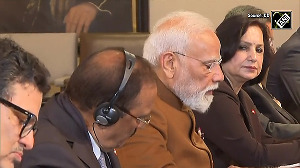'The best Indian movies today are ones that portray life as "something that doesn't end when the movies do".'
'There's no real arc to traverse or easy lessons to learn. And Irrfan and Nawazuddin -- who can both swerve a movie purely on the strengths of their instincts -- are just the perfect actors for this kind of movie sensibility,' says Sreehari Nair.
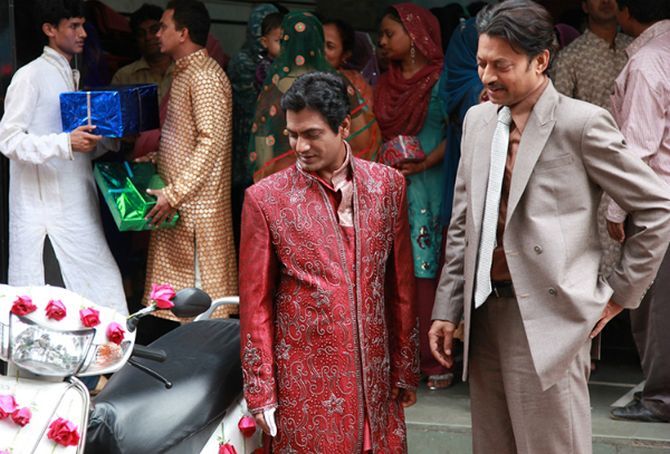
In a recently-broadcast commercial for Truecaller, the camera pans across a dozing watchman and comes to rest on an awake-as-a-rumour Nawazuddin Siddiqui -- who walks into the frame, looking dapper in a grey suit. The actor, who was himself a watchman at some point in his life (also a bit that's widely cited in articles such as '10 rags-to-riches stories that'll make your day') then proceeds to explain how he had fortuitously stumbled upon a phone call for a role in the movies, after regularly shirking calls during his night shifts.
There's not a hint of schmaltz in his rendition, but there is that candour we so associate with Nawaz. The commercial is also perhaps the most summarised statement that the actor has made about his craft.
In those 30 odd seconds, Nawaz doesn't just sketch out a character that we suspect the real him to be, but also plays it in a way that illustrates what makes his method and performances different from that of Irrfan Khan (the actor he is twinned with, most often).
Nawaz's characters -- like his parallel in the commercial -- are ones that have outgrown the inner torments that distinguish the bloody best of Irrfan's characters. His characters may have no answers to offer, but they have tiny moments of realisation -- moments that he mostly internalises and occasionally verbalises.
Consequently, what Irrfan conveys through laconica, Nawaz conveys using his vital juices.
In that sense, he is the exact opposite of an existential hero; one who substitutes the pangs of life with its little pleasures and also one who honestly revels in life's artifice -- like a child too busy with his building blocks to see the actual house around him crumbling.
In short, Nawazuddin Siddiqui is Irrfan Khan with a smiling face.
This in no way is a derision of Irrfan's prodigious talents. For, I believe, he is alongside Nawaz, one of the finest actors working in India right now. This, on the other hand, is a study of the two actors' respective approaches, and how these approaches are slowly redefining the idiom of Heroism in Hindi movies.
The Indian hero of today is different from the ones of yesteryears because he is dealing with tragic forces not explored in our cinema hitherto. The primary adversaries of an Indian hero in the past were the forces of society -- represented by factors, both social and economic.
In post-liberalisation India, when a movie character takes external predicaments too seriously, something doesn't quite add up in our heads. You can, of course, discount this jarring by saying, 'It's just a movie.' But to your truest self, you can tell that's Styrofoam-acting.
An Indian hero of 2015, for him to seem relevant, must also look inward; knowing very well that the primary evil resides within him. Ergo, we are more demanding of our actors; the really good ones are those who dig deep into themselves -- sometimes plunging into their own emptiness -- to design a matrix for their characters.
And while both Irrfan and Nawazuddin are great exponents of this form of acting, the results of their digging deep show fine overlaps and even finer variations.
It's not that hard to see why one may talk about Irrfan and Nawazuddin as similar actors. On a very cosmetic level, the argument presented is that they don't possess the good looks of our movie stars and that both had an extended period of struggle before receiving any sort of major recognition. This while true, is not even a passing reason for why we see them in the same mould.
The real rationale for the direct comparison is that Nawaz and Irrfan, despite being such powerful performers, are by conscious choice so unobtrusive.
![Nawazuddin Siddiqui in Peepli [Live].](http://im.rediff.com/movies/2012/apr/30sl8.jpg?w=670&h=900)
I remember telling people about Peepli [Live] and how the movie was only marginally salvaged by the performance of this actor who played Rakesh. Most people drew a blank at the mention of Rakesh. But when I detailed out the scenes he was in, these people were quick to recount how they thought those very scenes were the most striking ones in the movie.
Shoojit Sircar's Piku that released a few months ago, I thought, was a movie split sharply in two halves. In the first half, the lines rang like pre-meditated punches and Sircar cut to actors and events with utter self-consciousness; like every bit was there to get a point across.
However, even in that first half -- when the other actors seemed like they were parroting their way through -- Irrfan's scenes looked improvised; not everything he said was a punchline, there was also the inability to come up with a 'good one.'
You could tell he was feeling his oats; there's something very human about him making you aware of his process that way. And when he got into the thick of action in the second half, Irrfan elevated the performances of his co-actors as well. Amitabh Bachchan and Deepika Padukone, hence, seemed less mannered as the movie went on, and the goings-on itself started playing out like charming vignettes and not plot-movers.
To reinstate my point about their unobtrusiveness, I think both Irrfan and Nawaz are the kind of actors that can slip into a crowd unnoticed, and make the crowd itself seem more interesting; more cinematically-malleable.
In that sense, they are like two Chameleons -- it's hard to spot a Chameleon on the street, but after you've spotted one, it's hard not to describe the street itself in the context of the Chameleon's movements that add a special photographic vividness to everything in its surroundings.
This core similarity notwithstanding, to understand the difference in the crafts of Nawazuddin and Irrfan, you'll have to make an educated guess about what the actors are going for, when they hit the camera.
My guess is Irrfan tries to get to you by creating a sense of calculated dissonance and Nawaz looks for the tuning fork to match at a certain frequency. Nawaz's biggest strength is holding your attention for as long as he can, till you are saturated with just the right feel of that moment but never once burdened by it.
Irrfan, on the other hand, is more impressionistic; with the sum total of his various nuances, constituting his final portrayal. He makes you look away after you've grasped just enough, and in every scene he appears later, adds incremental bits -- a tilt of the head, an open mouth, maybe a slight and almost unheroic twirl of the moustache.
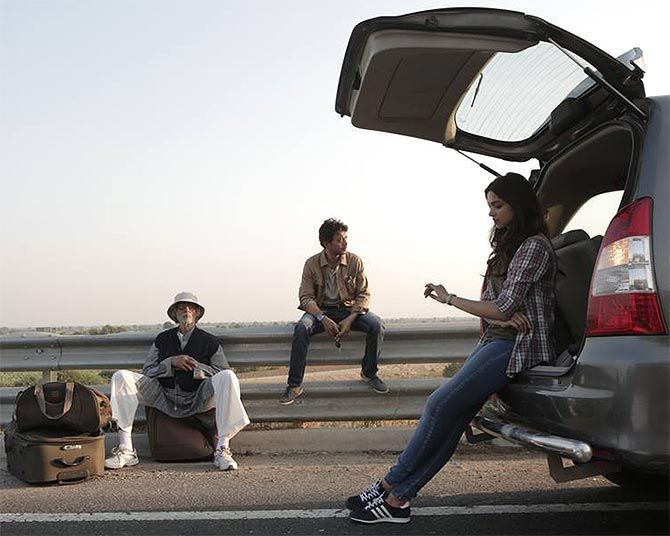
'When he got into the thick of action in the second half,'says Sreehari Nair, 'Irrfan elevated the performances of his co-actors as well. Amitabh Bachchan and Deepika Padukone seemed less mannered as the movie went on, and the goings-on itself started playing out like charming vignettes and not plot-movers.'
Each scene for Nawaz is a movie in itself, but to appreciate an Irrfan Khan performance, you'd have to watch a movie in its entirety. The result is that while you walk away from a movie theatre carrying with yourself an 'Irrfan Character,' what stay with you of a Nawaz performance are 'Nawaz Moments.'
The source of these 'Nawaz Moments' is the actor's appreciation of his characters' divided spirit -- an appreciation that he is not shy of conveying physically. Notice the way he carves out two completely different characters -- Faizal of Gangs of Wasseypur and Liak of Badlapur -- just by the way they hold their guns. In Wasseypur, the gun-holding projects authority and in Badlapur there is a weird teenybopper-like feel to the act.
Irrfan Khan, on the contrary, has created a career out of masterfully playing characters whose fine-motor skills, seem a tad underdeveloped. While he may not be a physical actor like Nawaz, Irrfan uses that characteristic to his own benefit.
So when he bares himself -- like say during an ugly brawl in Sahib, Biwi aur Gangster Returns or when he smashes a table in Yeh Saali Zindagi -- the effect doubles-up on the audience; you feel like he's bashing up some people on the screen and socking you between your ears, at the same time.
There is also a certain unpredictability about both Irrfan and Nawaz's presence; maybe also a sense of danger. Even in movies where everything seems like it's going astray, their introduction ensures a kind of disorderly-order.
The danger that Nawaz brings with himself is that while he covets your attention, deep down you know he is a hipster turned inside out. Irrfan's danger is that he works outside all codes -- moral included -- and is purely bound by artistic codes.
The only thing that can catch the hipster out in Nawaz is his interactions with women. In fact, he is terrific when he does that 'swallowing of saliva' routine and says with a twinkle in his eye, 'Chalegi Mere Saath?' Or 'Nahi Humko Laga Ki.' The terseness with which he says these lines suggests a sort of honest desire that no long monologue can.
In fact with Nawaz, the shorter the lines and the less poetic they are, the more effective they sound.
There are very few Indian actors -- Nana Patekar, Mohanlal and Nasseeruddin Shah are the only three I can think of -- who have in their careers, taken chances with obscenity and elevated it to a level of charm. Nawaz -- with his ability to add genuine feelings to even characters with a randy turn of mind -- is one other performer, who can pull that sort of an act off without lapsing into self-parody.
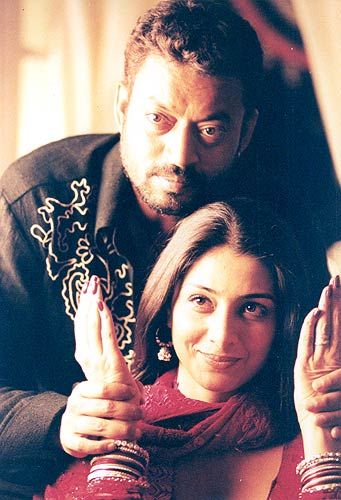
Irrfan, too, is wonderful with women; albeit in a different sort of way. In fact, you can see his existential angst working through more strongly in scenes of gentleness, and at times it’s shockingly effective.
Like in Maqbool, when Tabu points a gun at him and asks him to profess love to her by mouthing a series of jaunty lines, he play-acts. And once she hands the gun back to him, he slaps her.
Or in Life in a Metro, his consoling of Konkana Sen has the typical balmy-yet-unsure feeling of displaced souls.
Even in that brilliant scene in The Namesake with Tabu at the airport (which turns out to be their last meeting), he smiles back at her -- that typical Irrfan smile which even in its betrayal of emotions, depicts a trust, slow-cooked over years of togetherness.
If play-acting love is Irrfan's primary shtick, play-acting of toughness is Nawaz's major calling. When he is the pot-headed Faizal, you see him mock-shooting and as Wasseypur takes one spin after another and characters walk in and out, you know that Faizal has been gradually imbibing toughness from the movies he's watched and the stories he's heard.
His tenderness is the tenderness of kids who master the dance of love from watching mawkish movies and his toughness is the toughness of kids who scare other kids by mimicking the mythology of outlaws and dreaded gangsters.
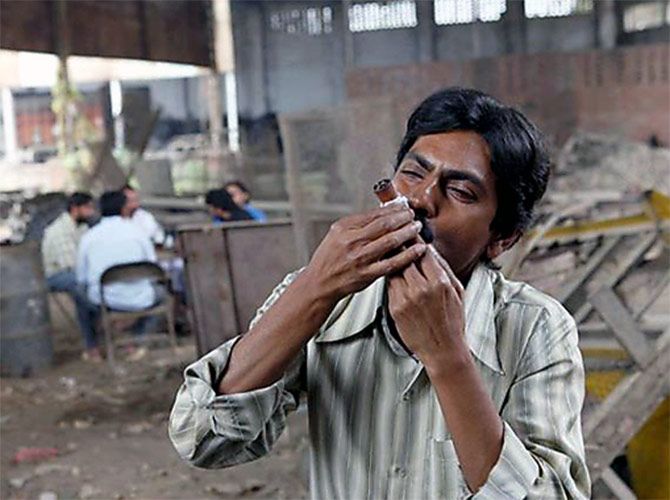
What grants Irrfan and Nawaz such auteur-like status is our back-of-the-mind knowledge, that they are as much a creator of their characters as the writers who conceived them. For them, there's more material to draw from their own lives than what a text on the paper contends.
On the Rajeev Masand Show that airs on the CNN-IBN channel, Nawaz recently appeared on a segment where a celebrity tells us a joke. Instead of a joke that ends in a definite way, the actor chose to narrate an incident from his native town about the local doctor who would pass off a refrigerator as an X-Ray machine and gullible villagers who believed the doctor for ages. I don't know how many people laughed at that little story, but I am sure Irrfan if he'd heard it, would surely be in stitches.
Resolution of conflicts has always been the primary release offered to a movie audience. However, like the French New Wave movies of the 1960s and the American Brats Generation movies of the 1970s, the best Indian movies today are ones that portray life as 'something that doesn't end when the movies do.'
There's no real arc to traverse or easy lessons to learn. And Irrfan and Nawazuddin -- who can both swerve a movie purely on the strengths of their instincts -- are just the perfect actors for this kind of movie sensibility.
To Irrfan, the world seems rotten and every moment of bliss is just a passing phase. For Nawaz, it's these passing phases make living in this rotten world, worth the experience. Despite this basic degree of divergence, what binds their performances is an indescribable sense of humanity; not the humanity of our high-school textbooks, but a more complex one gleaned from our tragic realities.
Nothing confirmed this better than Lunchbox in which a withdrawn Irrfan waited for a gregarious Nawaz to look the other way, so that he could sneak out. Irrfan didn't do this because he hated Nawaz. And Nawaz in turn understood, because he's drawing from the same reservoir that Irrfan is; just that his outlet is different.
The Chameleons may find themselves heading towards opposite ends of a street, but for now, here they are; face-to-face and maybe even doffing their hats to each other. For us in the audience, there's a lot to savour in the moment, even as it changes our ideals and dethrones our comforts.










